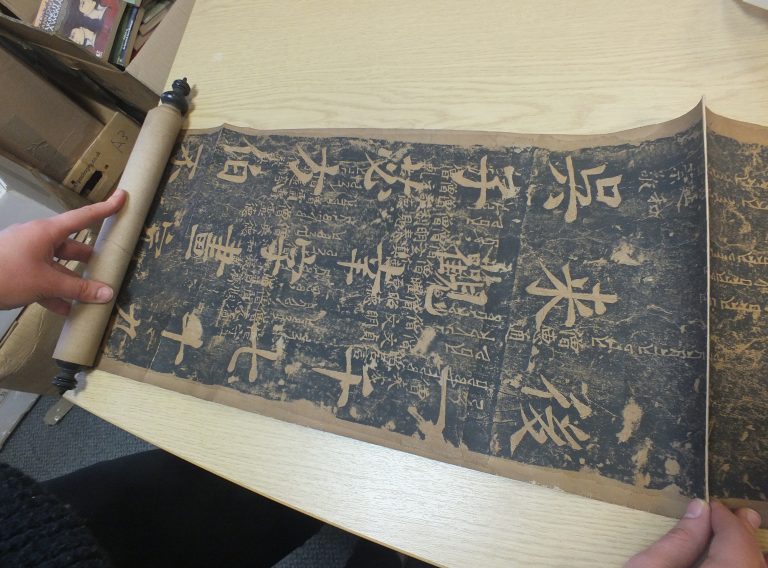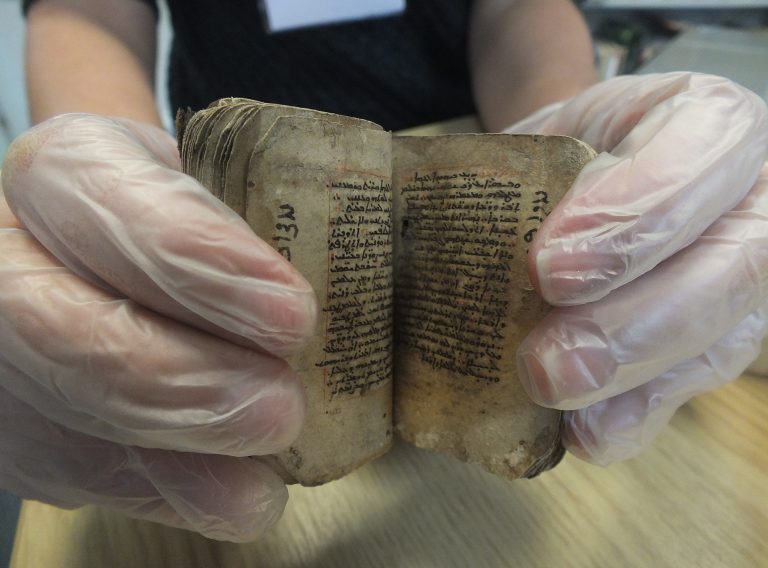Woodbrooke offers Student Placements to history students who are studying at the University of Birmingham. Daniel has been fortunate to delve into the weird and wonderful collection of Rendel Harris. He has been assisting with cataloguing the items as we decide where best to house the many pieces Rendel Harris left to Woodbrooke. Eleanor, Emma and Sian have been assisting with the indexing of the log books that were created at a time when Woodbrooke ran as a college. The logbooks go from 1903 to 1995, and they have been focusing on the 1940s and 1950s, enjoying the musings and drawings of Woodbrooke students who were here during those decades.
Daniel Theodorou:
‘Woodbrooke has definitely surprised me over the course of my time here. Through cataloguing the items in the strongroom, a lot of fascinating objects have been found.


The Chinese scrolls were perhaps the most challenging to work out, having initially been labelled Buddhist texts but now seem to be a message from one friend to another lamenting their absence. The silver cup also has an interesting backstory, as it was picked up by Rendel Harris from the ruins of a church during the Armenian massacres. The Syriac Psalter may arguably be the most intriguing though, with writing so small it seems impossible anyone could have actually written it. Before my placement, I never knew how much history could be packed into one room, and yet even as the weeks go on more items seem to appear that have passed down from Rendel Harris and past Woodbrookers to us. ‘
Emma Gordon:
‘I came to Woodbrooke as a placement student from the university in order to index the log books of past students here from the 1950s and whatever I had expected to take away from the experience, Woodbrooke has given me much more.
Starting out on this placement 8 weeks ago, Woodbrooke was something of an enigma to me, I didn’t know much about the institution, or indeed about Quakers in general, besides what I could find out through the internet (which wasn’t all that much). However, on my very first day of placement, I opened one of the log books placed in front of me and discovered a short passage written by an anonymous Woodbrooker over 50 years ago about their own first impression of being here and something in the description really resonated with me:
“My first and deepest impression was the atmosphere that is so typical of Woodbrooke. I met it as soon as I came inside the door, and I met it always and everywhere – a kindness, a helpfulness and – a smiling face. All are friends in spite of different races, nationalities, age, profession or interests, and everybody is so ready to help, so quick to smile, and so eager to answer your questions. This spirit of helpfulness, friendliness and joy is the most characteristic feature of Woodbrooke, and the thing that first struck me.”
Everyone I have met here has greeted me with a friendly smile and been most welcoming, and when the other placement students and I sit down at half past three for a quick break and a brownie, there is a calm serenity to the room that it would be easy to get lost in.
Through my time here I feel that I have gotten to know the students and residents of the 1950s Woodbrooke really rather well. Despite many comings and goings through the terms, some Woodbrooke habits stay the same: the numerous coffee and tea parties and the creative invitations that found their way between the pages of the log books; the obvious glee in dressing up and putting on plays, both original and classics; the fondness for country dancing and walking the Lickeys; and the numerous and often humorous complaints made about all sorts of aspects of Woodbrooke life, from getting up in the morning to writing essays. With such endearing qualities, it was easy to get attached to the many students of Woodbrooke and their strange humour and inside jokes. Some of the more colourful characters especially stood out with antics so strange or impressive that they would be continually referenced throughout entire log books; from the shocking incident of a beloved moustache being shaved off entirely without any forewarning, to a daring infiltration of Dartmoor Gaol, it was anyone’s guess as to what might turn up in the next log.
When coming to Woodbrooke, I expected perhaps to gain some insight into what indexing log books entailed and how a history degree might apply to it, instead what I have gained, without yet having finished, is: a new career plan; many wonderful people that I have gained the acquaintance of, both in the flesh and between the pages of a book; and some experiences that I had not foreseen such as manhandling doors and navigating the roads of the city centre (all of which seemed to be shut) to transport archives to the Birmingham Library. All in all, it has been a most rewarding placement to be on and one which I shall treasure dearly once it is over.’
Eleanor Dunning:
‘As a placement student from the University of Birmingham, the main role I have undertaken is indexing the Log Books completed by students taking courses at Woodbrooke from 1940 to 1944, consequently right in the midst of the Second World War.
What is perhaps most striking is the real variance in mentions of war throughout the books. Whilst some comment on the tight restrictions on heating and bathing, others very rarely mention the effects of the war, other than to maybe make a joke at Hitler’s expense. Where it is perhaps most noticeable is in the Log Book from Autumn 1942, as it is described how students were only allowed to have two baths a week of no more than four inches and that the heating is still turned off in November. Similarly, several of the poems featured convey that many of the students during this term became ill from the cold.
The most prominent effect of the war in the books are the descriptions of the air raids that occurred in the early 1940s. On November 19th1940 the log book describes how the night before they had had their worst raid yet, and as they were so frequent it was hard to imagine life without them. Nevertheless, this time was not without humour, as it is noted that a certain student was unfortunately in the bath one time the siren sounded. Furthermore, it was after these raids that twenty-three people who had been bombed out their homes nearby came to Woodbrooke. They stayed there under emergency billeting for nearly six weeks due to the spread of various ailments, and the residents were sorry to see them go.
Whilst Woodbrooke at this time may not have housed as many international students as usual, after having been through the students’ alien registration forms, it has surprised me just how many German and Polish students stayed or studied here during the war. Whilst we do not know whether they were refugees or had been living in England beforehand, we do know that their life in England was not easy during this time period. For example, Elfriede Lustig recounts that she spent Christmas at Woodbrooke as ‘the police didn’t give me the permission to leave’ due to her nationality. However, these differences in nationalities were not an obstacle in bonds forming between students. For instance, Polish Kristine taught Jamaican Oswald what he believed to be a romantic phrase in Polish, which he found out later actually meant “I love you, my green monkey”.
Therefore, whilst Woodbrooke was not untouched by the war, it certainly provided a place where students and staff alike could forget about what was happening in Europe and spend time learning together and building friendships, no matter of each other’s nationalities. Being able to spend a term here working on these Log Books has been an experience I’ll never forget, and I am very grateful to Betty and the rest of the team here for allowing me to take part in this fascinating project.’
Sian Kendall:
‘Amidst the infamous netball games, country dancing and complaining of the weather, the logbooks compiled by Woodbrooke Students between 1945-1949 reflect a more leisurely mood in the Post War Era.
V.E. day was met with rejoice as well as trepidation of what was to come. While students joined in the Bourneville celebrations, the Cadbury’s factor lit up and bonfires burning, there was still certain clarity at the end of it, with students stating that “it was a lovely funeral.”
Despite the awareness and concern of the war ravaged outside world that was the topic of many lectures, Woobrookers were able to find much time for recreation. The influx of foreign students, ranging from Scandinavia, Lebanon, New Zealand, Jamaica and India, created many opportunities for Woodbrookers to learn about different cultures, music and languages.
A key event that appeared in all of the log books in this period was the “At Home” event. Each year, the female students would open their rooms for the male students and vice versa, giving the students the opportunity to bring upon havoc in Woodbrooke. Women would find their rooms in darkness as their lightbulbs had mysteriously disappeared or men would find prickly thistles distributed in places that they shouldn’t be. The event was then celebrated with a play and cakes as well as plotting revenge for the future “At Home” events.
Woodbrooke also saw some terrible winters in this period, which was complained about often (in the most British way) especially because coal was rationed. A major blizzard hit in early March of 1947 which stopped the students from seeing a show, much to the disgust of the Scandinavian students who went anyway.
When the students were not playing ping pong tournaments in the winter or earning black eyes from the hockey tournaments in the summer, students spent much of their time writing and performing plays. The plays in most cases were based off funny moments of the student’s daily life, but in certain cases they were exceptionally creative. Spring of 1948 marked production of the ‘World Without…men’, which was written and performed by the female students. A male student observed; ‘There was a tense moment when Margaret Hobling [a senior lecturer], with obvious satisfaction, pressed the button which was to exterminate every male creature on the earth.’
Working on these logbooks as part of my placement has been an extremely rewarding experience. It has been exceptionally interesting to gain such a personal insight into life at Woodbrooke in this period, including their inside jokes, their attitudes to social issues and their excessive amount of coffee parties. I have thoroughly enjoyed working on this project.’



